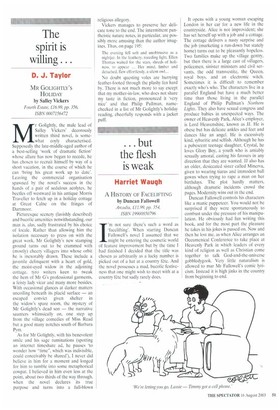. . . but the flesh is weak
Harriet Waugh
A HISTORY OF FACELIFTING by Duncan Fallowell Arcadia, £11.99, pp. 354, ISBN 19900850796 I'mnot sure there's such a word as lacelifting.. When starting Duncan Fallowell's novel I assumed that we might be entering the cosmetic world of feature improvement but by the time I had finished I decided that the title was chosen as arbitrarily as a lucky number is picked out of a hat at a country fête. And the novel possesses a mad, bucolic festiveness that one might wish to meet with at a country fête but sadly rarely does. It opens with a young woman escaping London in her car for a new life in the countryside. Alice is not improvident; she has set herself up with a job and a cottage. The cottage delivers a nasty surprise and the job (marketing a run-down but stately home) turns out to be pleasantly hopeless. Two families make up the village gentry, but then there is a large cast of villagers, policemen, sinister ministers and civil servants, the odd transvestite, the Queen, royal boys, and an electronic witch. Sometimes it is difficult to remember exactly who's who. The characters live in a parallel England but have a much better time than those living in the parallel England of Philip Pullman's Northern Lights. They also have sexual congress and produce babies in unexpected ways. The owner of Heavenly Park, Alice's employer, is Lord Heavenshire, known as IL He is obese but has delicate ankles and feet and dances like an angel. He is excessively kind, sybaritic and selfish. Although he has a pubescent teenage daughter, Crystal, he loves Glory Boy, a youth who is amiably sexually amoral, casting his favours in any direction that they are wanted. .11 also has an older, desiccated sister called Minerva, given to wearing tiaras and immodest ball gowns when trying to rape a man on her birthdays. The plot hardly matters, although dramatic incidents crowd the pages. Modernity wins out in the end. Duncan Fallowell controls his characters like a manic puppeteer. You would not be surprised if they were spontaneously to combust under the pressure of his manipulation. He obviously had fun writing this book, and for the most part the pleasure he takes in his jokes is passed on. Now and then he lost me, as when Alice arranges an Oecumenical Conference to take place at Heavenly Park in which leaders of every kind of religion as well as Christian come together to talk God-and-the-universe gobbledygook. Very little naturalism is allowed to mar Mr Fallowell's comic lyricism. Instead it is high jinks in the country from beginning to end.










































































 Previous page
Previous page